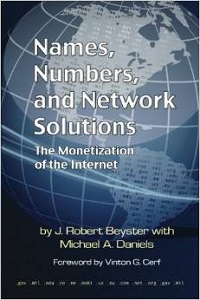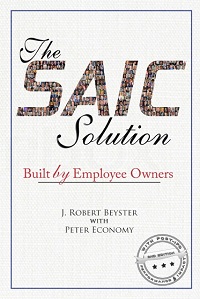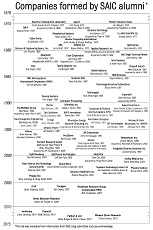Week seven: Ownership impacts performance?
11 Comments Published by Dr. Beyster June 9th, 2006 in Employee Ownership.Thanks for your responses. Although I prefer that you reply through this blog, I do appreciate those of you who have sent me email responses as well.
I’ve got something on my mind, and I’m looking forward to hearing your perspectives. I’m wondering how employee ownership has personally impacted your performance or the performance of your organization. Examples would be nice.
Click on the comments link to share your thoughts.
- Bob





Bob;
The story of Project ALPHA, which as you know lasted 10 years, made very good money, led to cleared staff that was able to leverage the clearances into new projects in the Intelligence Community and kept SAIC at the forefront of what was at the time considered a National priority, is a story of Joel Resnick, Jack Goldstien, Mark Albrecht, John Warner and I pursuing both our perochial interests and our individual organizational interests in a ballance that can only be explained by the keen appreciation for our stake in the company as a whole.
Unfortunately much of the detail is still beyond the telling. But Jack Goldstien and I struck a collaborative relationship that was never written, but never violated. More than once either Jack or I had to select a course of action that ballanced our individual organization’s profit against an opportunity for project growth for the company as a whole. I can not think of a single case where the company interest failed to be the basis on which the decision was made, even at some short term cost to one organization or the other.
If this is the kind of story you are looking for there is undoubtedly more material that we can extract from the participants in this SAIC adventure and success story.
Employee owenership was a motivator for me joining SAIC. I liked the idea that as a company we would all be working twords the same end goal…success, thus money. I also liked the idea that if my work was and enabler for someone else they would use it and I would get credit for it in some form. the other thing that influences me was that I could own part of my company. I found these to be true, and it is a rewarding to be a part of an employee owned company
Dear Dr. Beyster,
Not to be depressing, but to be (overly?) honest, employee ownership (of SAIC stock) did not have a large impact on the performance of most employees.
The fault was not with you, or company policies. You gave stock to everyone within the retirement plans, and you encouraged direct employee purchases in the ESPP (Employee Stock Purchase Plan), by giving a 5-15% “discount”. You always offered stock, with valuable options, to new employees, and to Groups/Divisions showing Good+ performance. The CODA was an excellent way to save pre-tax dollars, since we were not allowed (by the IRS) to add to our IRAs. This was especially valuable before Reagan, when the personal income tax rate was as high as 70%.
Your multi-faceted collection of stock programs must have been good. They were copied word-for-word by several companies, including an “eventually bought-out” cross-town rival.
Investment advisers always recommended NOT buying the stock of your employer, especially if it was not publicly traded, and especially if it was a “small” company. They also recommended “diversification”, meaning, not too much of your savings in one industry, and especially not in one single company. I always wondered why these “Professional Investment Gurus” still had to work, if they were so good. They must have loved their work and/or took their own “advice”.
The biggest strike against stock ownership was/is that most people say that they cannot save “right now” for many “reasons”. For most of them “right now” lasts forever. (95% of U.S. citizens die broke.)
Now, ignoring the big-spenders, for those of us who figured out how to save, and buy extra stock, SAIC stock ownership was one of the top 3 motivators of excellent performance. The other 2 were freedom to work on interesting programs, with the highest caliber co-employees. Correction: Make that 4 motivators; Number 1 was Freedom (from typical aerospace industry “direct supervision”, and 12-layer management org. charts).
Thank you very much for your 35 years of dedication to your vision. It works. As a percentage of past employees, SAIC must be in the Top-10 for “spinning off” new, successful businesses, and multi-millionaires.
Bob,
From my viewpoint and 24-year experience with SAIC, employee ownership in its many forms was a major driver and motivator for my performance and the vast majority of the employees that I worked with, up, down and laterally. To me, as an employee with a stake in the successful performance of SAIC projects and contracts and the rewards that came with the successful performance, I chose to put in a little more time if that was what it took to get a job done well. Also, it was why I frequently put in a few more hours in the evenings and Saturdays to be sure we accomplished a task on time and well. This same motivation existed with most of the employees with whom I worked. This was the case with the senior managers and engineers and with the technicians, secretaries and administrative assistants as well. The successful performance that we achieved as a team was well rewarded with the recognition that we all received through cash and stock performance awards, stock options, the opportunity to buy additional stock and the company contributions to all of our retirement funds.
I think employee owership has been a key factor in the successful performance and growth of SAIC over the years.
I have been personally involved in hiring a number of new employees and for the most part, I believe the fact that our company has been employee owned has been the over riding factor helping individuals decide to come to work for us. There has always been questions from the prospective new employees wanting to know more about “this thing they had heard about the company being employee owned and what it meant to them”. I believe it is one of the major ways we have been able to attract the “cream of the crop” of new employees.
When I joined SAIC, I was told that employee ownership was a motivator for an “all for one” mentality and that it would lead to direct employee involvement like “turning off the lights” to save money on electricity. Of course, at Campus Point, this was a literal impossibility, since they turned off by themselves, but the point was made. I personally appreciated being rewarded with stock for good performance. These bonuses made good sense tax-wise and increased my stake in the company. As time passed and my role changed, I worked on proposals and projects for the benefit of the “greater good” and long range, not short time goals. I think being employee owned instilled a sense of pride that from the outside was sometimes confused with arrogance, but I believe it motivated good performance not just at the top of the pyramid, but by everyone who felt they had a stake in the company’s success.
Employee ownership has changed the way I think about professional performance forever. At SAIC, it meant that the first question in my mind was, “how will this decision, this program, this situation with the customer affect my company’s best interests and my employee-owner colleagues?” I came to call this attitude the “shared responsibility” mindset – where we could not just make decisions based on personal self-interest, because the consequences of those decisions would ricochet throughout the owners of the company. But the effect of employee ownership thinking has been even more pronounced as I have moved into new organizations post-SAIC. Now I call it the “take ownership” mindset – when I’m working with PIs to develop new business opportunities inside a university, I talk to the faculty about taking ownership of the idea, the problem, and their responsibility to identify solutions. The employee ownership idea became a philosophy about taking ownership of an effort – not just because I owned stock, but because no problems get solved (no proposals written, no contracts signed, no analytical or scientific challenges overcome) until someone takes ownership of the responsibility to DO something.
Gael Tarleton
The culture of employee ownership leads all levels of managers to make decisions that benefit the company and not just themselves.
I had the pleasure to work on several acquisitions. Embracing the employee ownership culture, I realized that the money that we were about to spend to make the acquisition will be coming out of the pockets of my co-workers. The due diligence and negotiations were personal. I was not using “funny money” of some outsiders, but the savings of my friends.
Regards,
Bill Wright
Overall, employee ownership was a huge motivator and made you feel like family. My staff and I didn’t want to let the family down. Many of us worked many, many hours of uncompensated overtime to ensure success for our customers at USSTRATCOM, which of course, we achieved. It was for the SAIC family and we were very proud indeed. Our customers were very impressed with the dedication and comittment as well as the product quality.
It was clear that performance brought on more ownership. Even the new staff that performed well got a good chunk of ownership largely from CEO stock! What a great message – the CEO cares!
The bottom line is that the dedication to the SAIC team was cemented by employee ownership. What an honor and privelege to work for such a great team. Thank you for setting it up!
Dr. B,
I joined SAIC in 1983 and never left, that’s how EO has effected me! I’d say the connection between me and the company occurred when I started interacting with the customer. Before that I was solely technical and kept my head down working. But when I started dealing with customers I felt they were *my* customers and that I had could directly benefit the company by the project being successful.
I also told my friends about SAIC and that I “wouldn’t get sold off to some company in Minneapolis and have to move.” I felt like the goals of the company were also my goals and that (though it might sound funny) we were in it together. I still feel that way about SAIC, thus my current employment choice…
I think Employee ownership benefits not only the company but obviously the employee work ethic. From my experience as an HR director I see more personal satisfaction in the new hires as well as the current employees. It’s a motivator and I don’t see it ever having a downside. Unless greed of the company gets in the way that is, usually by the board of directors :)~.